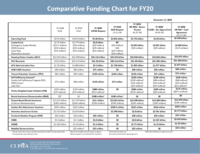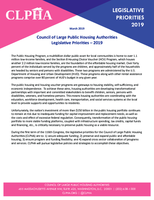On December 20, President Trump signed HR 1865, the “FY2020 Further Consolidated Appropriations Act” the second minibus funding bill for FY20 containing appropriations for the Department of Housing and Urban Development (HUD), among others. The bill was signed into law (PL 116-94) with just hours to go before the continuing resolution keeping the government funded expired at midnight.
The bill includes $4.549 billion for the Public Housing Operating Fund, $2.869 billion for the Capital Fund, and $21.502 billion for Housing Choice Voucher renewals. Overall, the bill provides the voucher and public housing programs with additional funding above the President’s request, once again rejecting the Administration’s drastic cuts to housing programs.
Click below for an overview of the FY20 funding levels for several programs of interest to CLPHA members, along with selected passages and/or rationale of policy directives and recommendations from the House and Senate Joint Explanatory Statement (the “agreement”) (italicized; and, in part, bolded for emphasis), along with CLPHA’s updated funding chart.
CLPHA's Review of FY20 Funding Bill
On December 16, House and Senate appropriators reached an agreement on THUD funding for FY 2020. The House voted 280-138 today to pass the bill and the Senate is expected is to vote later this week, before the current Continuing Resolution expires on December 21. The bill includes $4.549 billion for the Public Housing Operating Fund, $2.869 billion for the Capital Fund, and $21.502 billion for HCV renewals. Overall, the bill provides the voucher and public housing programs with additional funding above the President’s request, once again rejecting the Administration’s drastic cuts to housing programs.
Passage Sets the Stage for Conference Negotiations with the House
On October 31, 2019, the U.S. Senate, by a vote of 84-9, passed their amended HR 3055, the “Commerce, Justice, Science, Agriculture, Rural Development, Food and Drug Administration, Interior, Environment, Military Construction, Veterans Affairs, Transportation, and Housing and Urban Development Appropriations Act, 2020” a compilation of four appropriations subcommittee bills also known as minibus II.” The THUD portion of the bill, Division D, is the text of S. 2520, the bill previously passed by the Senate Appropriations Committee last month.
On September 26, the U.S. Senate passed a continuing resolution to fund the government through November 21. The short-term spending bill, which passed by vote of 82-15, maintains level funding for federal agencies and programs, including the U.S. Department of Housing and Urban Development.
The House voted to pass the CR on September 19 by a vote of 301-123 and the final bill now moves to the President’s desk for signature, which is expected by the Monday deadline.
On September 19, the full Senate Appropriations Committee agreed to, and unanimously passed, their version of the FY20 funding bill for Transportation, Housing and Urban Development and Related Agencies (T-HUD) on a recorded vote of 31 to 0.
The previous week, the Senate appropriations committee agreed to allocations for the 12 subcommittees with T-HUD receiving $74.3 billion in total discretionary funding. Of that amount, the discretionary funding level allocated to the Department of Housing and Urban Development (HUD) totaled $48.6 billion, an increase of $2.3 billion above the FY19 enacted level.
In a familiar pattern and reprise of repudiating Trump Administration budget proposals, the Senate T-HUD bill reflects Congress’ continuing commitment to fund critically important housing and community development programs the Administration has proposed rescinding, cutting, or eliminating.
Below is an overview of the Senate committee’s proposed FY20 funding levels for several programs of interest to CLPHA members, selected passages and rationale of policy directives and recommendations from the Committee Report (italicized; and, in part, bolded for emphasis), along with CLPHA’s updated funding chart.
On September 19, 2019, the full Senate Appropriations Committee agreed to, and unanimously passed, their version of the FY20 funding bill for Transportation, Housing and Urban Development and Related Agencies (T-HUD) on a recorded vote of 31 to 0, with a manager’s amendment making technical changes to the bill offered by T-HUD Subcommittee Chairwoman Susan Collins (R-ME), as the only amendment agreed to by the committee.
Chairwoman Collins said about the bill, “(t)his legislation will support job creation and economic development, allow us to make critical improvements to our infrastructure, provide housing assistance for low-income seniors and other vulnerable populations, and enhance oversight of the FAA’s aviation safety and aircraft certification programs.”
In a major win for housing authorities, the bill includes close to verbatim language offered by CLPHA and other public housing industry groups to reject HUD’s attempt to force PHAs to execute a highly problematic revised ACC without mutual agreement by public housing agencies.
The U.S. Senate followed the U.S. House on August 1 and passed by a vote of 67-28 HR 3877, the “Bipartisan Budget Act of 2019”, the all-encompassing two-year budget deal that increases spending for military and domestic programs, suspends the debt ceiling through mid-2021, and eliminates the threat of sequestration.
The deal increases spending by $320 billion over existing law and sequestration levels for the next two years, and permanently eliminates the threat of sequestration in subsequent years. Without the deal, $126 billion in sequestration cuts from the 2011 Budget Control Act (BCA) would trigger in January, affecting every discretionary account in the federal government. The BCA expires with this deal.
The bill is now headed to the White House where President Trump has indicated he is eager to affix his signature.
On July 25, the House passed an all-encompassing two-year budget deal that increases spending for military and domestic programs, suspends the debt ceiling through mid-2021, and eliminates the threat of sequestration. The 284-149 vote for passage was supported by 219 Democrats and 65 Republicans, while 16 Democrats, 132 Republicans and one independent voted “no.”
HR 3877, the “Bipartisan Budget Act of 2019” increases total discretionary spending from $1.32 trillion in the current fiscal year to $1.37 trillion in fiscal 2020 and $1.375 trillion in 2021.
The Senate is expected to act on the bill next week and send it to Trump for his signature before Senators also leave for their summer recess.
On June 25, 2019, the U.S. House of Representatives voted 277-194 to approve a $383 billion spending package of five appropriations bills, including funding for the departments of Transportation, Housing and Urban Development, and related agencies.
The House-passed bill includes $50.1 billion for HUD, an increase of $5.9 billion above the FY19 enacted level, and $13.4 billion above President Trump’s request.
After the House Appropriations Committee passed HR 3163, the FY20 Transportation, and Housing and Urban Development Appropriations Act, the bill was bundled into the second minibus appropriations bill of the season as HR 3055 - Commerce, Justice, Science, Agriculture, Rural Development, Food and Drug Administration, Interior, Environment, Military Construction, Veterans Affairs, Transportation, and Housing and Urban Development Appropriations Act, 2020.
HR 3055 is expected to head to the House floor sometime during the week of June 17, after the House Rules Committee determines which amendments shall be ruled in order for floor consideration. Three amendments in HR 3055 being considered by the Rules Committee under Division E (THUD) are of particular concern to CLPHA and affordable housing stakeholders:
- Amendment #4 sponsored by Rep. Paul Gosar (R-AZ) would prohibit “federal funds for the housing of unauthorized aliens;”
- Amendment #8 sponsored by Rep. Glenn Grothman (R-WI) would strike “language in the bill [Sec. 234] that would prohibit funds from being used to implement the Department of Housing and Urban Development’s May 10, 2019 proposed rule regarding verification of recipients’ eligible immigration status.”
- Amendment #34 sponsored by Rep. Doug LaMalfa (R-CA) would also strike “section 234 of the Transportation-Housing and Urban Development Division to allow HUD to implement the proposed rule entitled “Housing and Community Development Act of 1980: Verification of Eligible Status” to ensure that affordable housing is not provided to unauthorized aliens.”
Since Congress must pass appropriations bills—to keep the government open and funded—passage of any of these three amendments in this appropriations bill would make it much harder to prevent implementation of HUD’s non-citizen rule.
On June 4, 2019, the full House Appropriations Committee agreed to and passed the FY20 funding bill for Transportation, Housing and Urban Development and Related Agencies (THUD) by a recorded vote of 29 to 21, with a manager’s amendment making technical changes to the bill offered by THUD Subcommittee Chairman David Price, as the only amendment agreed to by the committee.
The discretionary funding level for the Department of Housing and Urban Development (HUD) totals $50.1 billion, an increase of $5.9 billion above the FY19 enacted level, and $13.4 billion above President Trump’s request.
In a familiar pattern and reprise of repudiating Trump Administration budget proposals, the House THUD budget reflects Congress’ continuing commitment to fund critically important housing and community development programs the Administration proposed rescinding, cutting, or eliminating. Under the leadership of THUD Subcommittee Chairman David Price (D-NC) and Ranking Member Mario Diaz-Balart (R-FL), the THUD proposal increases – in several instances substantially increases – or level funds programs important to CLPHA members.
As Chairman Price noted during the committee markup, “What does this bill do? First and foremost, we’re investing in infrastructure. Whatever is going on elsewhere in government, our bill is investing in infrastructure, right here, right now. Transportation and housing infrastructure, infrastructure broadly conceived. We are a nation in the midst of an affordable housing crisis and this bill dedicates new resources to address it.”
In addition to robust funding increases, such as the doubling of Choice Neighborhoods to $300 million, the proposal also reflects priorities CLPHA vigorously advocated for with the appropriators, including legislative language to prevent HUD from evicting mixed-status immigrant families from public housing, and to prohibit HUD from unilaterally changing the public housing annual contributions contract without public input and following the administrative procedures act process. Importantly, the Administration’s “rent reform proposals” were singled out in the committee report as not included in the bill. Those proposals included mandatory rent increases and work requirements for public housing residents.
Click below for an overview of the committee’s proposed FY20 funding levels for several programs of interest to CLPHA members, selected passages and rationale of policy directives and recommendations from the Committee Report (italicized and/or bolded for emphasis), along with CLPHA’s updated funding chart.
The Trump Administration released the remainder of its fiscal year 2020 (FY18) budget on March 18. The proposal would completely eliminate all funding in FY20 for the Public Housing Capital Fund and slash funding for the Public Housing Operating Fund by almost $2 billion, a combined loss of $4.6 billion. The proposal additionally eliminates the Choice Neighborhoods Initiative, HOME, CDBG, and other programs, while adding $100 million for the Rental Assistance Demonstration (RAD) program and eliminating the cap on RAD conversions.
Click below for a review of proposed funding levels for some programs of interest, and links to CLPHA's comparative funding chart and the joint industry funding recommendations from CLPHA, NAHRO, and PHADA.
Click here to read CLPHA's Review of Trump's FY2020 Budget Proposal


